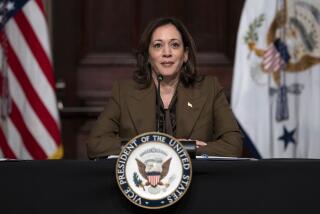Reagan Calls Hope for Talks Too High : Has Final Session With Shultz Before Secretary Leaves to Meet Gromyko
- Share via
WASHINGTON — President Reagan, indicating concern that expectations for next week’s meetings between Secretary of State George P. Shultz and Soviet Foreign Minister Andrei A. Gromyko are too high, complained Friday that the talks have been portrayed as though they will produce “the whole settlement of all problems,” his spokesman said.
Reagan conferred on arms control issues with a bipartisan group of congressional leaders for about an hour and later met with Shultz in his final session with the secretary of state before the conference begins in Geneva on Monday. Shultz leaves for Europe tonight.
The Reagan Administration appeared to be receptive to congressional proposals that representatives of the Senate and House join the U.S. delegation to any arms control talks that might evolve from next week’s conference. These representatives would merely observe rather than take part in negotiations, however.
Stevens, Nunn Named
Sens. Ted Stevens (R-Alaska), chairman of the Appropriations Committee’s panel on defense spending, and Sam Nunn (D-Ga.), the ranking minority member on the Senate Armed Services Committee, were named to head a 10-member group.
Meanwhile, the President was described Friday as insistent that the United States proceed with $26 billion in research on a space-based defensive weapons system. At the same time, he continues to stress that flexibility and “new ideas” are needed in renewed efforts to limit the superpowers’ nuclear arsenals.
White House spokesman Larry Speakes said Reagan told the congressional leaders that “he is strongly convinced a defensive mode is certainly a worthwhile approach and . . . a legitimate subject for research, which we’re pursuing.”
That meeting, one day after the 99th Congress convened for the first time, gave Reagan and his national security adviser, Robert C. McFarlane, an opportunity to make a pitch on behalf of the Pentagon budget. McFarlane told the congressional leaders that the Pentagon buildup, as well as Reagan’s plans to build the MX missile, were factors in the Soviets’ willingness to discuss new arms negotiations with Shultz.
Speakes, reporting on the session with the members of Congress, said Reagan told his visitors that the Geneva conference “has been pictured as if this meeting is to be the whole settlement of all problems.”
‘Preparatory’ Meetings
“It is preparatory,” Reagan said, reminding his audience that Shultz and Gromyko are meeting to discuss the possibility of resuming the arms control talks that were broken off by the Soviet Union in late 1983.
The same point was made after the meeting by Rep. Dante B. Fascell (D-Fla.), chairman of the House Foreign Affairs Committee.
“Negotiations might not even take place,” Fascell cautioned. “This is a meeting to determine where we’re going and how we’re going, and hopefully it will lead to something more (substantive).”
Meanwhile, an adviser to the Soviet government, Stanislas Menshikov, said in an interview from Moscow on NBC News’ “Today” show that the Soviet Union is “ready for radical solutions, for a radical cutdown in weapons.”
With U.S. officials saying that Reagan has no intention of bargaining away planned research for a space defense system, known in the Administration as the Strategic Defense Initiative and commonly referred to as “Star Wars,” Menshikov declared: “Space is a crucial issue. If there is no decision on space, we will be in an arms race for the next 10 or 15 years.”
Senate Majority Leader Robert J. Dole (R-Kan.) said after the meeting with Reagan that “everything is going to be negotiable.” But he reported that Reagan did not explicitly say whether Shultz would place the space defense plan on the bargaining table.
Fascell said the issue of the space-based defensive system was raised “in the sense that it is part of the family of weapons and systems that ultimately would have to be discussed in some way if we are going to have meaningful negotiations.”
And Senate Minority Leader Robert C. Byrd (D-W.Va.) said, “We have to be optimistic . . . if for no other reason than the fact the Soviets are willing to talk about future negotiations.”
Byrd said the “important thing the President stressed is that there be unity and cohesiveness among our legislative and executive branches and among Republicans and Democrats.”
More to Read
Sign up for Essential California
The most important California stories and recommendations in your inbox every morning.
You may occasionally receive promotional content from the Los Angeles Times.












